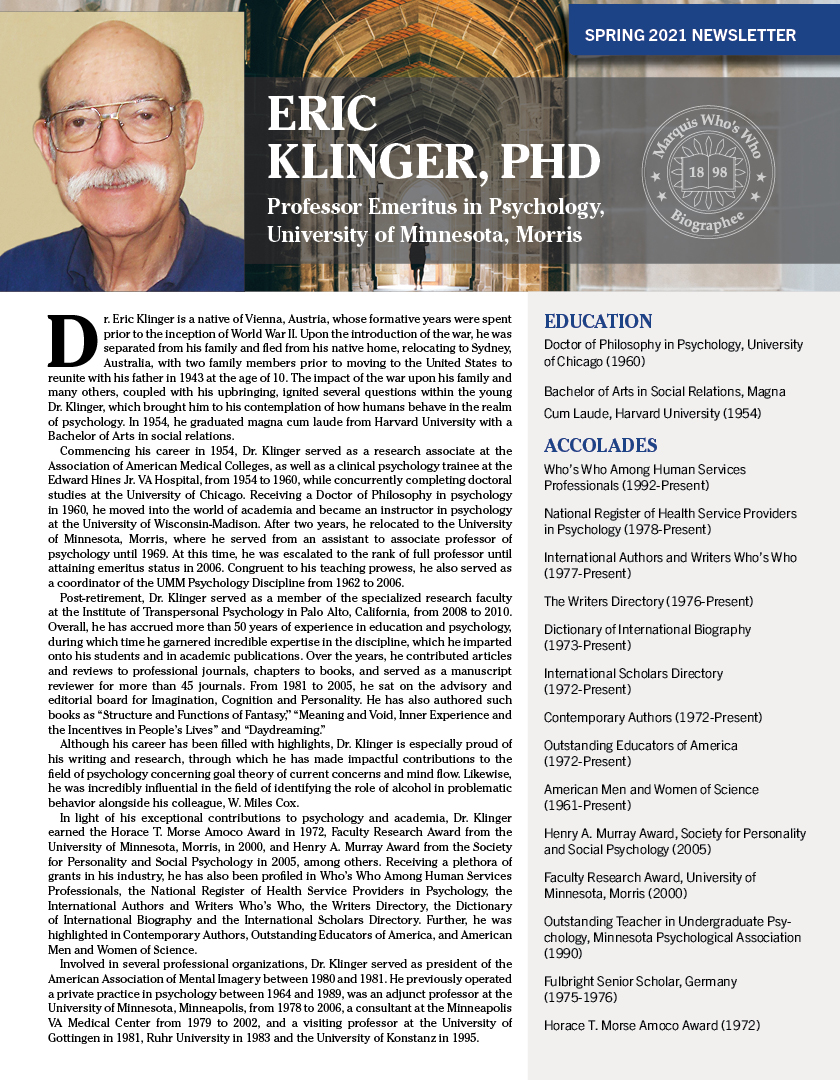
Dr. Eric Klinger is a native of Vienna, Austria, whose formative years were spent prior to the inception of World War II. Upon the introduction of the war, he was separated from his family and fled from his native home, relocating to Sydney, Australia, with two family members prior to moving to the United States to reunite with his father in 1943 at the age of 10. The impact of the war upon his family and many others, coupled with his upbringing, ignited several questions within the young Dr. Klinger, which brought him to his contemplation of how humans behave in the realm of psychology. In 1954, he graduated magna cum laude from Harvard University with a Bachelor of Arts in social relations.
Commencing his career in 1954, Dr. Klinger served as a research associate at the Association of American Medical Colleges, as well as a clinical psychology trainee at the Edward Hines Jr. VA Hospital, from 1954 to 1960, while concurrently completing doctoral studies at the University of Chicago. Receiving a Doctor of Philosophy in psychology in 1960, he moved into the world of academia and became an instructor in psychology at the University of Wisconsin-Madison. After two years, he relocated to the University of Minnesota, Morris, where he served from an assistant to associate professor of psychology until 1969. At this time, he was escalated to the rank of full professor until attaining emeritus status in 2006. Congruent to his teaching prowess, he also served as a coordinator of the UMM Psychology Discipline from 1962 to 2006.
Post-retirement, Dr. Klinger served as a member of the specialized research faculty at the Institute of Transpersonal Psychology in Palo Alto, California, from 2008 to 2010. Overall, he has accrued more than 50 years of experience in education and psychology, during which time he garnered incredible expertise in the discipline, which he imparted onto his students and in academic publications. Over the years, he contributed articles and reviews to professional journals, chapters to books, and served as a manuscript reviewer for more than 45 journals. From 1981 to 2005, he sat on the advisory and editorial board for Imagination, Cognition and Personality. He has also authored such books as “Structure and Functions of Fantasy,” “Meaning and Void, Inner Experience and the Incentives in People’s Lives” and “Daydreaming.”
Although his career has been filled with highlights, Dr. Klinger is especially proud of his writing and research, through which he has made impactful contributions to the field of psychology concerning goal theory of current concerns and mind flow. Likewise, he was incredibly influential in the field of identifying the role of alcohol in problematic behavior alongside his colleague, W. Miles Cox.
In light of his exceptional contributions to psychology and academia, Dr. Klinger earned the Horace T. Morse Amoco Award in 1972, Faculty Research Award from the University of Minnesota, Morris, in 2000, and Henry A. Murray Award from the Society for Personality and Social Psychology in 2005, among others. Receiving a plethora of grants in his industry, he has also been profiled in Who’s Who Among Human Services Professionals, the National Register of Health Service Providers in Psychology, the International Authors and Writers Who’s Who, the Writers Directory, the Dictionary of International Biography and the International Scholars Directory. Further, he was highlighted in Contemporary Authors, Outstanding Educators of America, and American Men and Women of Science.
Involved in several professional organizations, Dr. Klinger served as president of the American Association of Mental Imagery between 1980 and 1981. He previously operated a private practice in psychology between 1964 and 1989, was an adjunct professor at the University of Minnesota, Minneapolis, from 1978 to 2006, a consultant at the Minneapolis VA Medical Center from 1979 to 2002, and a visiting professor at the University of Gottingen in 1981, Ruhr University in 1983 and the University of Konstanz in 1995.